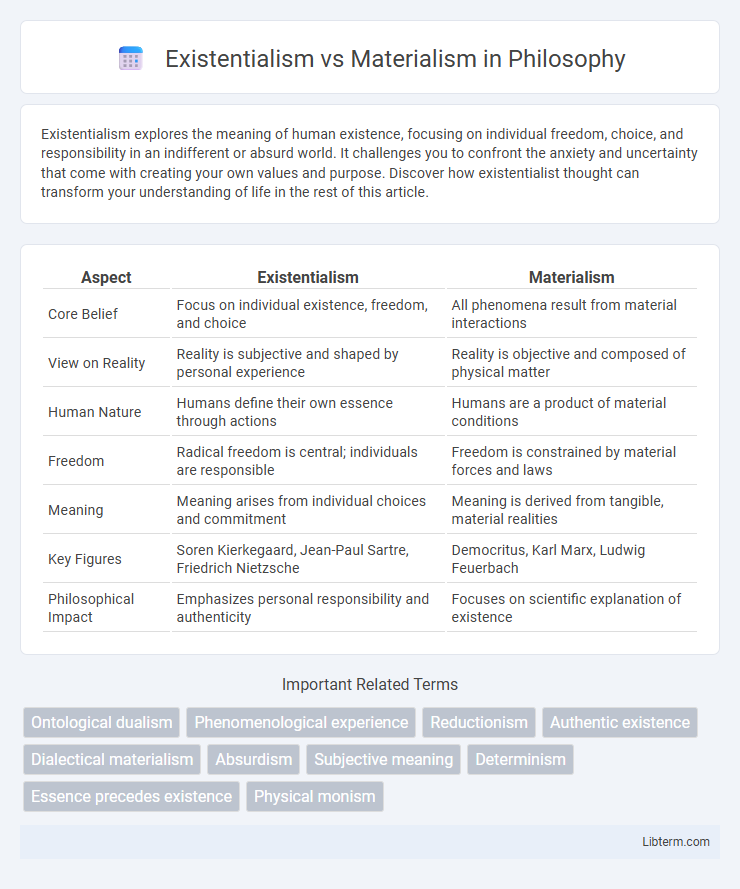Existentialism explores the meaning of human existence, focusing on individual freedom, choice, and responsibility in an indifferent or absurd world. It challenges you to confront the anxiety and uncertainty that come with creating your own values and purpose. Discover how existentialist thought can transform your understanding of life in the rest of this article.
Table of Comparison
| Aspect | Existentialism | Materialism |
|---|---|---|
| Core Belief | Focus on individual existence, freedom, and choice | All phenomena result from material interactions |
| View on Reality | Reality is subjective and shaped by personal experience | Reality is objective and composed of physical matter |
| Human Nature | Humans define their own essence through actions | Humans are a product of material conditions |
| Freedom | Radical freedom is central; individuals are responsible | Freedom is constrained by material forces and laws |
| Meaning | Meaning arises from individual choices and commitment | Meaning is derived from tangible, material realities |
| Key Figures | Soren Kierkegaard, Jean-Paul Sartre, Friedrich Nietzsche | Democritus, Karl Marx, Ludwig Feuerbach |
| Philosophical Impact | Emphasizes personal responsibility and authenticity | Focuses on scientific explanation of existence |
Understanding Existentialism: Core Principles
Existentialism centers on individual freedom, choice, and authentic existence, emphasizing personal responsibility in creating meaning amidst an inherently meaningless world. Key principles include the concepts of angst, absurdity, and the rejection of predetermined essences, highlighting that existence precedes essence. Philosophers like Jean-Paul Sartre and Soren Kierkegaard underscore the importance of subjective experience and self-awareness in confronting life's uncertainties.
Materialism Defined: Foundations and Key Concepts
Materialism is a philosophical doctrine asserting that physical matter constitutes the fundamental substance of reality, with all phenomena, including consciousness and thought, arising from material interactions. Rooted in early atomistic theories and modern scientific inquiry, materialism emphasizes empirical evidence and the laws of nature as the foundation for understanding existence. Key concepts include the rejection of supernatural explanations, the primacy of sensory experience, and the belief that mental states are byproducts of physical processes in the brain.
Historical Development: Existentialism and Materialism
Existentialism emerged in the 19th and 20th centuries, influenced by philosophers like Soren Kierkegaard, Friedrich Nietzsche, and Jean-Paul Sartre, emphasizing individual freedom, subjective experience, and the search for meaning in an absurd world. Materialism traces back to ancient Greek thinkers such as Democritus and Epicurus, evolving through Enlightenment figures like Karl Marx who focused on the material conditions of existence and economic structures shaping human life. Both philosophies reflect historical responses to human nature: existentialism centers on personal consciousness and choice, while materialism analyzes tangible reality and social forces.
Major Philosophers: Existentialists and Materialists
Existentialism, championed by philosophers like Jean-Paul Sartre and Soren Kierkegaard, emphasizes individual freedom, choice, and subjective experience as the core of human existence. Materialism, with key figures such as Karl Marx and Democritus, asserts that physical matter and material conditions fundamentally determine reality and consciousness. The existentialist focus on personal meaning contrasts with the materialist view that tangible, observable phenomena shape human life and societal structures.
Free Will and Determinism: Diverging Views
Existentialism emphasizes individual free will, asserting that humans create their own meaning and choices in an inherently meaningless universe, highlighting personal responsibility and authentic existence. Materialism, rooted in physicalism and determinism, argues that all phenomena, including human behavior and decision-making, are results of material interactions and causal laws, reducing free will to an illusion. This fundamental divergence frames existentialism as advocating for subjective freedom, while materialism insists on objective determinism based on scientific laws.
Meaning of Life: Existential vs. Material Perspectives
Existentialism views the meaning of life as self-created through individual choice, emphasizing personal freedom, authenticity, and confronting absurdity. Materialism interprets meaning through tangible, physical existence, asserting that life's purpose derives from material conditions, sensory experience, and scientific understanding. These contrasting perspectives highlight a fundamental divide between subjective meaning and objective reality in defining human existence.
The Role of Consciousness in Both Philosophies
Existentialism emphasizes consciousness as the foundation of individual freedom, self-awareness, and authentic existence, asserting that human beings create meaning through their conscious choices. Materialism views consciousness as a byproduct of physical processes within the brain, reducing subjective experience to neural activity and denying any metaphysical priority of consciousness over matter. The contrast highlights existentialism's prioritization of subjective human experience versus materialism's focus on objective, material conditions shaping consciousness.
Ethical Implications: Moral Frameworks Compared
Existentialism emphasizes individual freedom, responsibility, and authentic choice, advocating that moral values are self-created rather than externally imposed. Materialism grounds ethics in physical reality and often aligns with utilitarian or pragmatic frameworks, prioritizing tangible outcomes and empirical consequences. The ethical tension between these philosophies lies in subjective moral autonomy versus objective, consequence-based value systems.
Influence on Modern Society and Thought
Existentialism profoundly shapes modern society by emphasizing individual freedom, authentic experience, and personal responsibility, influencing contemporary philosophy, psychology, and art. Materialism drives advancements in science and technology by prioritizing physical reality and empirical evidence, shaping economic models and consumer culture. The dynamic interplay between existentialist values of meaning and materialist focus on tangible progress fuels ongoing debates in ethics, identity, and societal development.
Existentialism vs. Materialism: Which Resonates Today?
Existentialism emphasizes individual freedom, personal meaning, and authentic existence, resonating deeply in today's search for purpose amidst societal pressures. Materialism, with its focus on physical reality and possessions, appeals in consumer-driven cultures but often falls short in addressing emotional and spiritual fulfillment. The enduring relevance of existentialism lies in its challenge to find intrinsic values beyond material wealth in an increasingly complex world.
Existentialism Infographic

 libterm.com
libterm.com